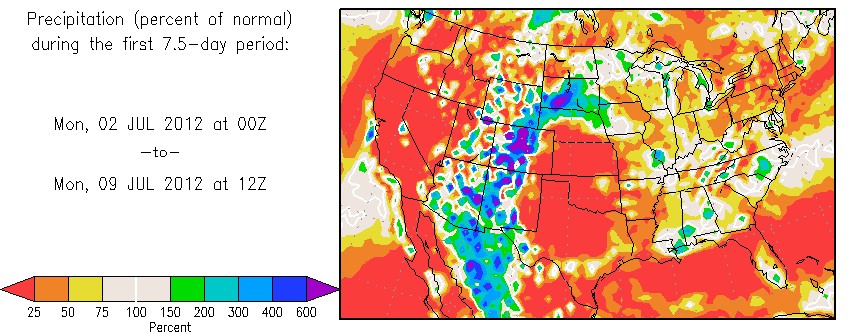Long, hot summer: Wildfires thrive on drought, heat and wind
Hundreds of homes have burned in Colorado and other Western states, and it could be just the start.
By Bettina Boxall, Los Angeles Times
July 2, 2012, 5:00 a.m.After several years of relatively benign fire seasons, the West is headed into a hot, dry summer of potentially ferocious blazes like the ones that have scorched Colorado in recent weeks.
Nonsense. There is a very strong flow of monsoonal moisture pouring into the southwest now which normally continues for the rest of the summer. The fire season here is May and June, and sometimes in the autumn.
The wildfires that have already destroyed more than 700 homes and outbuildings along Colorado’s Front Range and blackened hundreds of thousands of acres of New Mexico wilderness are not likely to be the season’s last for one simple reason: drought.
With 400 to 600% of normal precipitation forecast along the Front Range and in New Mexico’s Gila wilderness, I think Bettina doesn’t know what she is talking about.
10-Day Precipitation Outlook for the Conterminous U.S.
“This year, fires are going big,” Tom Harbour, fire and aviation director for the U.S. Forest Service, said last week. “We’ve had some really extraordinary runs … fires that are running 10 miles in lighter fuels. Fires that are running miles in forested areas.”
A dry La Nina winter and a paltry, quick-melting snowpack in much of the West have set the stage for another incendiary summer, compounding the effects of a long-term drought that has gripped the seven-state Colorado River basin for more than a decade.
Long, hot summer: West’s wildfires feed off drought, heat and wind – latimes.com
Complete crap. She started out the article mentioning that we have had several years of benign fire seasons. That was because we have been having very heavy snowfall. Lake Powell has gained 55 feet of water since 2004, because of record snowmelt and runoff in the Colorado River Basin.




Reporters are lazy. It’s much easier to regurgitate government press releases than it is to spend time researching stories. Global warming is a wonderful front-page bogeyman because every severe weather event can be blamed on it. It doesn’t require any thinking.
Reblogged this on Climate Ponderings.
kirkmyers is right. These reporters just bang out anything that sounds like it fits their agenda with out ever fact checking so they can get back to their fun and games without further interuption. What, carefully consider and understand what they are reporting? Those days are long gone because they aren’t being trained in logical thinking and fear they would lose their jobs if they actualy do understand and would like to print the reality of what is happening. As many people know the newspapers are so liberally and fanatically biased against conservatism, patriotism, capitalism, and common sense that they aren’t worth reading anymore.
I was told by a station manager that it is not the job of the media to verify things. They just ask someone labelled as an expert and use their statements. It’s kind of like YouTube, only with a studio and paychecks.
I looked at the Lake Powell data page and don’t see the positive trend shown in your graph. What am I missing?
The base article was written in 2012. This is 2024. I just looked at their data set, at least the first page. Of course, you know that rainfall will be cyclical, and uncontrolled. The inflow to the reservoir shows this in the data set I looked at, which starts in 2014. However, the outflow, which is controlled, is moderated to much tighter limits than the uncontrolled inflow. This is unnatural. If there were no dam, the inflow and outflow would be roughly equal. There are a lot of reasons why they regulate the outflow: farming, fish, wildlife in general, flood control, etc. I’m sure that the outflow is subject to certain contracts, and that it is further complicated by “environmental” feel good regulation, making it less and less possible for the operators to choose a level of water within the dam and a reasonable outflow. In general, politics and environmental regulations get in the way of wise water management.